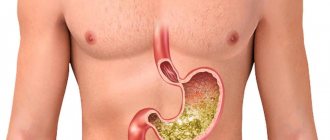Laryngitis is an inflammatory disease of the larynx, which is one of the consequences of influenza, ARVI, whooping cough, scarlet fever, rhinitis, tonsillitis, and pneumonia.
With laryngitis, the vocal cords are the first to suffer - the patient’s voice becomes hoarse or disappears altogether. Breathing becomes difficult, and a so-called “barking” cough appears, which is quite painful.
Laryngitis in adults can also occur as an independent disease, for example, when the voice is overstrained (the so-called “teacher’s disease”).
It is customary to distinguish between acute and chronic laryngitis .
1
Diagnosis of laryngitis in MedicCity
2 Diagnosis of laryngitis in MedicCity
3 Diagnosis of laryngitis in MedicCity
Acute laryngitis
In acute laryngitis, the disease lasts for 7-10 days. Acute laryngitis is quite rare to occur on its own. This disease manifests itself along with inflammation of the pharynx, nasal cavity, bronchi and lungs. The cause of the development of acute laryngitis is considered to be acute respiratory diseases, thermal or chemical burns, and injuries. Severe hypothermia, dry air, excessive vocal tension, existing foci of inflammation and impaired nasal breathing can also lead to laryngitis.
In advanced, severe cases, laryngitis can become life-threatening for the patient. If the pain in the throat is so acute that it is difficult for a person with laryngitis to even swallow his own saliva, you should immediately call a doctor! A tumor in the larynx can block the passage of air. You should also consult a doctor if hoarseness, hoarseness (or complete absence) of the voice does not stop 3-5 days after the onset of the illness.
Why does laryngitis appear?
- Each organism is individual, so it is impossible to say for sure what causes laryngitis. Laryngitis is usually caused by several factors, including:
- Various colds (measles, acute respiratory infections, flu, others).
- A reaction to allergens (this can be paints, dust, wool), quite often the disease occurs after the family has moved to a new apartment, which has been renovated and furniture has been purchased. Hypothermia. With a weakened young body, even an ordinary draft can cause laryngitis
- Anatomical features of the structure of the respiratory organs: with a narrow larynx, laryngitis can even lead to a complete narrowing of the larynx, after which breathing becomes very difficult.
- Parents should monitor the air quality in the room where the baby is. Dry air, smoky air, dusty air, as well as air containing large amounts of exhaust gases are undesirable.
- A mechanical factor cannot be excluded when the larynx is severely strained or damaged. This can happen with long or loud singing, screaming, gastroesophageal disease, or foreign bodies.
The risk group includes children with chronic diseases of the nasopharynx, who have impaired breathing or have dental diseases.
Chronic laryngitis
If inflammation of the larynx continues for more than a month, then we are talking about chronic laryngitis . Quick diagnosis and proper treatment of the disease are very important here.
The causes of chronic laryngitis can be:
- untreated acute laryngitis;
- significant professional voice loads for teachers, artists, announcers;
- excessive smoking;
- alcoholic drinks with high alcohol content that dry out the throat;
- too hot and spicy food;
- untreated gastroesophageal reflux disease with reflux of hydrochloric acid into the esophagus and larynx.
It is very important to consult an ENT doctor if you have symptoms of inflammation of the larynx. Otolaryngologists at our clinic will help you cope with the unpleasant symptoms of laryngitis and other diseases of the ear, nose and throat.
1
Consultation with an otolaryngologist in MedicCity
2 Consultation with an otolaryngologist in MedicCity
3 Consultation with an otolaryngologist in MedicCity
Diagnostics
When treating laryngitis, first of all, an otolaryngologist performs an initial diagnostic examination using laryngoscopic instruments and mirrors, and takes smears for laboratory analysis.
If necessary, a detailed assessment of the condition of the larynx is carried out using a rigid telescope, which magnifies the image of the pathological area.
At the next stage, a biopsy may be performed. Additionally, a general blood and urine test is prescribed. Based on the results of the study, the otolaryngologist sees the full clinical picture of the disease and prescribes the necessary therapy.
Laryngitis in children
This disease begins with a runny nose and dry cough, then the child develops a sore throat, and the voice becomes hoarse and unrecognizable. At night, the child most often begins to wheeze because the lumen of the airways narrows. He develops a suffocating cough, his face becomes pale, and the nasolabial triangle begins to acquire a bluish tint. Temperatures may rise to 40 degrees.
How to treat laryngitis in a child? The treatment regimen and medications for laryngitis should be prescribed by a doctor: many medications that are used in the treatment of laryngitis in adults can cause an allergic reaction in a child.
It is recommended to give the child plenty of alkaline drinks (warm milk, mineral water). Antihistamines and hypoallergenic syrups are prescribed to relieve irritation and inflammation of the laryngeal mucosa. Alkaline inhalations are also very effective for laryngitis in children. Parents who are faced with laryngitis in children, as a rule, even travel with an inhaler-nebulizer, which allows them to quickly stop a coughing attack in their child.
If a child develops a “barking cough,” delay is especially dangerous—spasm of the respiratory tract (“false croup”) may occur. In severe cases, progression of the disease can lead to respiratory arrest. Call an ambulance immediately!
Treatment
When treating laryngitis, the patient needs physical and vocal rest (5-7 days).
It is necessary to drink more warm alkaline liquids (milk, Borjomi), this helps with dryness and itching in the larynx. You need to gargle with weak solutions of antiseptics (furacilin, potassium permanganate, soda, boric acid, romazulan, resorcinol), as well as infusions of medicinal plants (chamomile, sage). Local use of an antibiotic (bioparox) and astringents (hydrocortisone, chymotrypsin, collargol) is possible.
Inhalations
Effectively carry out alkaline inhalations (baking soda solution, “Essentuki”, “Borjomi”, “Narzan”), sanitation of the oropharynx with solutions of Lugol, iodinol, vegetable oils (olive, apricot, peach). It is better to apply a warm compress to the neck area.
Medicines
Drug therapy includes restorative, antitussive, antihistamine, immunostimulating, antimycotic (antifungal), enzyme, and homeopathic drugs. For a viscous, hysterical cough of viral or bacterial etiology, medications that thin the sputum in the bronchi (mucaltin, bromhexine, ACC) are prescribed.
Antibiotics
The need to prescribe antibacterial drugs is determined by the doctor. This is acceptable in the case of concomitant pathology of a viral or bacterial nature. For acute and extensive inflammatory phenomena, treatment is prescribed empirically using broad-spectrum antibiotics.
What should you not do if you have laryngitis?
You should not eat food that irritates mucous tissues (hot, salty, spicy, too sweet, cold, hot, rough). You should refrain from smoking, do not drink alcohol, and do not get too cold.
Physiotherapy includes:
- therapeutic laser;
- steam inhaler (nebulizer);
- electrophoresis.
How to recognize laryngitis?
Changes in voice.
A characteristic symptom of acute laryngitis is complete or partial loss of voice, resulting from narrowing or spasm of the glottis.
Initially, there is a feeling of dryness, soreness and burning in the throat. Gradually, the patient's voice becomes rougher and hoarse. In some cases, the development of aphonia is observed (loss of sonority of speech and the ability to speak only in a whisper). This condition is due to the fact that the vocal cords swell during laryngitis and temporarily lose their ability to vibrate, due to which sound is produced. Cough.
At first it is dry and painful, sometimes it can be rough and intrusive, accompanied by congestion in the chest and sounds like a staccato bark of a dog. Over time, the cough becomes productive, that is, sputum begins to be released. Its quantity increases as the disease progresses.
Other symptoms. In most cases, acute laryngitis is accompanied by:
- increased body temperature (usually slight);
- pain in the throat, which usually intensifies when swallowing;
- difficulty breathing;
- general malaise;
- headache.
Nonspecific symptoms of acute laryngitis include tachycardia (rapid painful heartbeat), low blood pressure and some other symptoms.
our employees
Ostroukhov Ivan Mikhailovich
Chief physician, doctor of the highest category. Honored Doctor of the Russian Federation General management of the branch's activities
Grigorieva Alla Alexandrovna
Deputy Chief Physician for Outpatient Clinics
Coordination of scientific activities of the branch
Otorhinolaryngologist of the highest category. Associate Professor of the Department of Otorhinolaryngology and Ophthalmology of ASMU, Doctor of Medical Sciences
Surgical treatment of pharyngeal pathology in children and adults, surgical treatment of benign neoplasms of the ENT organs, surgical interventions for reconstruction of the facial skeleton
Kharitonov Dmitry Anatolievich
Deputy Chief Physician for Medical Affairs, Senior Researcher, Associate Professor of the Department of Otorhinolaryngology and Ophthalmology of ASMU
Otorhinolaryngologist of the highest category, Candidate of Medical Sciences
Control over the medical activities of the branch. Rhinosurgery, otosurgery
Efremov Alexander Lvovich
Deputy Chief Physician for Organizational and Methodological Work
Organization of branch activities, communication with healthcare institutions, ministries, insurance companies
Mukhtarov Kairat Maksutovich
Head of the otolaryngology department.
Otorhinolaryngologist of the highest category, Candidate of Medical Sciences
Otosurgery, cochlear implantation, rhinosurgery, surgical interventions to restore the function of the larynx and trachea
Kolokolov Oleg Vladislavovich
Head of outpatient department
Audiologist-otorhinolaryngologist of the first qualification category
Organization and implementation of activities for the diagnosis, treatment and rehabilitation of patients with diseases associated with hearing impairment
Sokolova Alina Igorevna
Phoniatrician of the highest qualification category
Treatment of diseases associated with voice disorders
Obetanov Anton Andreevich
Otorhinolaryngologist
Rhinosurgery. Treatment of purulent-inflammatory diseases of the neck. Otosurgery
Dolotkazin Stanislav Khalilovych
Otorhinolaryngologist of the first qualification category
Otosurgery, rhinosurgery, surgical treatment of benign neoplasms of ENT organs. Surgical treatment of pharynx pathology in children and adults
Startseva Victoria Valerievna
Otorhinolaryngologist
Conducting initial outpatient visits to patients, surgical treatment of pharyngeal pathology in children and adults
Abdulzagirova Raisat Magomedsalamovna
Audiologist-otorhinolaryngologist
Audiology, audiology – otorhinolaryngology
Additional recommendations
Sprays should be used with extreme caution, especially in young children. It has been noticed that in some cases a strong jet can cause a spasm of the back wall of the pharynx. Don't forget about a possible allergic reaction. It is necessary to pay attention to the child’s breathing not only during illness, but also after it. Breathing should be uniform and through the nose.
Gargle with herbal decoctions and solutions several times a day.
If your baby's throat is very swollen, warm foot baths, warming and massage of the calf muscles can help. As a result of such actions, blood circulation will increase and swelling of the vocal cords will decrease.
Nebulizer: inhalation is easy
It is very convenient to carry out inhalations using a nebulizer. Their only drawback is that they cannot be used for procedures using solutions of essential oils and herbal decoctions. As a rule, alkaline water and special ready-made solutions, which can be purchased at the pharmacy, are poured into nebulizer sprayers. But some nebulizer models have special attachments that allow you to carry out procedures using herbs and oils.
Why are nebulizers so popular? They can be used even in small patients, even during sleep, safety (since the steam temperature will not be too high), high efficiency (the required amount of the drug is inhaled).
The following drugs are used for inhalation: - Medicines that can only be prescribed by the treating pediatrician; — Soda solution; — Herbal decoctions and essential oils, but it is worth considering that not all nebulizers are designed for this; — Alkaline mineral water (Borjomi); - Garlic juice.








